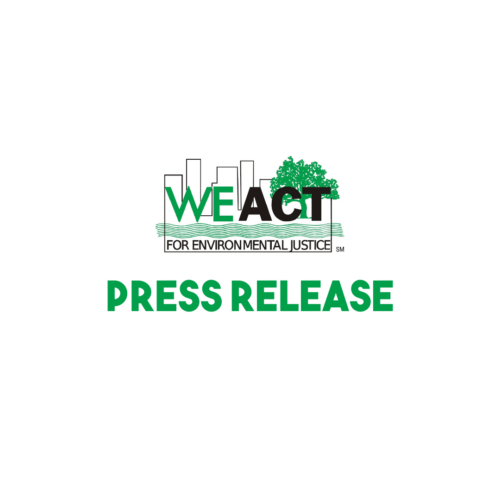Contact:
Ivan Moreno, NRDC, imoreno@nrdc.org, 312.651.7932
Ashley Sullivan, WE ACT for Environmental Justice, ashley.sullivan@weact.org , 1 (917) 837-1183
New Tools Show How Trump EPA Funding Cuts Harms Communities
Interactive maps and stories show local impacts and lived experiences of communities affected by clawbacks of federal investments
WASHINGTON, D.C. (Sept. 16, 2025) – Two companion maps published today – the narrative Stolen Futures StoryMap and the data-rich Stolen Futures Grants Dashboard – show how the Trump administration’s funding cuts are harming communities across the nation. Stolen Futures maps spotlight communities relying upon $37 billion in promised grants from twelve congressionally mandated programs at the Environmental Protection Agency. So far, $29 billion of grants have been unlawfully cancelled or frozen, and the fate of billions of dollars more is uncertain or at risk. These unlawful terminations cut off communities nationwide from critical projects to clean up contaminated sites, improve air and water quality, and provide health services.
“We spent years developing recommendations so investments would actually reach those most burdened,” said Peggy Shepard, Co-Founder and Executive Director of WE ACT for Environmental Justice. “Listening to communities isn’t optional; it’s the only way these dollars deliver real benefits.”
WE ACT and NRDC (Natural Resources Defense Council) developed Stolen Futures by examining 910 federal grants and sub-grants and interviewing impacted organizations from across the country.
“This [Justice40 and WHEJAC] was the first time I felt they were actually listening. Finally our issues were being heard, about the environment, racism, and violence,” said Vi Wagihi, Environmental Health and Justice Program Director of Alaska Community Action on Toxics (ACAT) “The funding was introduced to end the erosion of our communities, places that don’t have the infrastructure and it’s a dire need.”
Urgent funds at risk or canceled spanned both red and blue states. Among them:
- Solar for All (Austin, TX): PODER’s coalition-led clean energy access and green jobs.
- Thriving Communities (Boston, MA): Alternatives for Community & Environmental (ACE)’s regional grantmaking to lower barriers for small community based organizations to access resources.
- Inclusive Energy Innovation Prize (Detroit, MI): Green Door Initiative’s “Motor City to Solar City” workforce and resilience hub.
- Community Change Grant (Chicago, IL): People for Community Recovery’s Hazel M. Johnson Institute and former school building restoration environmental justice community center and lab.
- Climate Pollution Reduction Grant engagement (Seattle, WA; Atlanta, GA; Kansas City, MO; Denver, CO): Community-centered plans to cut pollution, lower bills, and create jobs.
These grants represented a historic level of funding for vital local priorities.
“Why not move to something [Justice40] that could be protective and beneficial, create jobs, provide renewable energy options that reduce energy costs?” said Donele Wilkins, Founder and CEO of Green Door Initiative in Detroit, Michigan. “I think we can create a thriving, wonderful neighborhood using this vision. This is helping a lot of people with jobs, affordable housing, and the cost of energy.”
U.S. cities, states, and community-based organizations applied for the following grants, which are included in the Stolen Futures dashboard, in 2023 and 2024 and started receiving funding from 2024–2025:
- 106 Community Change grants across 41 states, territories, and Tribal Nations
- 60 Solar for All grants across 54 states, territories, and Tribal areas
- 20 Thriving Communities grants across 13 states, territories, and Tribal areas
- 13 National Clean Investment Fund grants and regrants across more than 15 states and territories
- 113 Clean Communities Investment Accelerator grants and regrants across 31 states and territories
“Direct funding for community-driven projects unlocked the creativity and hope that delivers real solutions that transform people’s lives,” said Ella Mendonsa, senior program manager for NRDC. “Instead, the administration’s cuts to these programs and projects will mean fewer jobs, less energy options, and higher costs for working families.”
The Trump administration canceled or froze thousands of these much-needed community grants. By unlawfully terminating these funds, the Trump administration is taking away almost all of the awarded grants from communities which were going to be used to clean our air and water, removing and remediating hazardous pollutants like lead and asbestos in U.S. schools and homes, and so much more.
“I think what’s most disappointing about all these changes and losing what was promised to us is this sense of ‘what do we do now?’” said Carlos Pinon, Resilience Coordinator at PODER Austin. “The rug was just kind of pulled out from under us and put a big question mark on our future of what we’ll be able to do.”
###
WE ACT for Environmental Justice is a Northern Manhattan-based, membership-driven organization whose mission is to build healthy communities by ensuring that people of color and/or low-income residents are meaningfully included in the development of sound and fair environmental health and protection policies and practices. WE ACT has offices in New York and Washington, D.C. Visit us at weact.org and follow us on Facebook, Bluesky, and Instagram.
NRDC (Natural Resources Defense Council) is an international nonprofit environmental organization with more than 3 million members and online activists. Established in 1970, NRDC uses science, policy, law and people power to confront the climate crisis, protect public health and safeguard nature. NRDC has offices in New York City, Washington, D.C., Los Angeles, San Francisco, Chicago, Beijing and Delhi (an office of NRDC India Pvt. Ltd).
